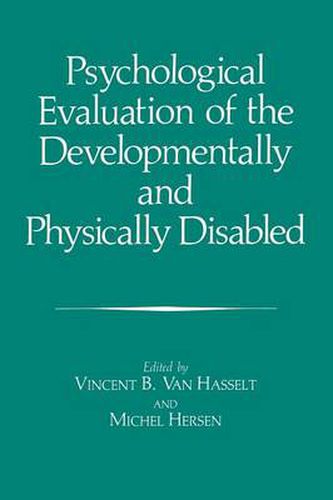Readings Newsletter
Become a Readings Member to make your shopping experience even easier.
Sign in or sign up for free!
You’re not far away from qualifying for FREE standard shipping within Australia
You’ve qualified for FREE standard shipping within Australia
The cart is loading…






This title is printed to order. This book may have been self-published. If so, we cannot guarantee the quality of the content. In the main most books will have gone through the editing process however some may not. We therefore suggest that you be aware of this before ordering this book. If in doubt check either the author or publisher’s details as we are unable to accept any returns unless they are faulty. Please contact us if you have any questions.
The past decade has witnessed a considerable upsurge of clinical and research interest in the problems of developmentally and physically the fields of psychology, disabled persons. Indeed, professionals from special education, rehabilitation, psychiatry, and social work have all directed attention to the development and implementation of evaluation and remedial programs. The heightened activity in this area is in part a result of early assessment research with these popUlations, which provided preliminary evidence of difficulties in social and emotional adjustment in many disabled individuals. In response to these findings, many intervention efforts have been implemented to deal with these issues and improve the life situation of the disabled. Also, there were indications that developmentally and physically disabled children often were deprived of adequate educations. As a result, legal and legislative initiatives have been enacted in recent years to make public education available to all students irrespective of disability. Central to all therapeutic and psychoeducational endeavors with the disabled is psychological evaluation. Only through careful and com prehensive psychological evaluation can areas of deficit as well as strengths be identified. Once treatment targets and goals have been ascertained, psychological evaluation is needed to determine the efficacy of intervention strategies. However, the field of psychological evalua tion, in general, and with disabled persons, in particular, has become highly specialized. This is largely a function of the changing roles of psychological evaluators.
$9.00 standard shipping within Australia
FREE standard shipping within Australia for orders over $100.00
Express & International shipping calculated at checkout
This title is printed to order. This book may have been self-published. If so, we cannot guarantee the quality of the content. In the main most books will have gone through the editing process however some may not. We therefore suggest that you be aware of this before ordering this book. If in doubt check either the author or publisher’s details as we are unable to accept any returns unless they are faulty. Please contact us if you have any questions.
The past decade has witnessed a considerable upsurge of clinical and research interest in the problems of developmentally and physically the fields of psychology, disabled persons. Indeed, professionals from special education, rehabilitation, psychiatry, and social work have all directed attention to the development and implementation of evaluation and remedial programs. The heightened activity in this area is in part a result of early assessment research with these popUlations, which provided preliminary evidence of difficulties in social and emotional adjustment in many disabled individuals. In response to these findings, many intervention efforts have been implemented to deal with these issues and improve the life situation of the disabled. Also, there were indications that developmentally and physically disabled children often were deprived of adequate educations. As a result, legal and legislative initiatives have been enacted in recent years to make public education available to all students irrespective of disability. Central to all therapeutic and psychoeducational endeavors with the disabled is psychological evaluation. Only through careful and com prehensive psychological evaluation can areas of deficit as well as strengths be identified. Once treatment targets and goals have been ascertained, psychological evaluation is needed to determine the efficacy of intervention strategies. However, the field of psychological evalua tion, in general, and with disabled persons, in particular, has become highly specialized. This is largely a function of the changing roles of psychological evaluators.